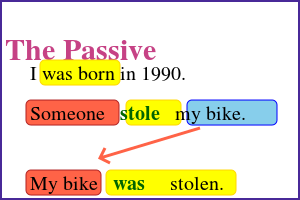Passive/Passive Present Perfect: Unterschied zwischen den Versionen
K (-Kurzinfo Quiz) |
K (Textersetzung - „[[Tenses/“ durch „[[“) |
||
| (8 dazwischenliegende Versionen von 2 Benutzern werden nicht angezeigt) | |||
| Zeile 1: | Zeile 1: | ||
Im [[ | Im [[Present_Perfect|Present Perfect]] besteht das Verb im Passiv aus '''drei''' Bestandteilen: | ||
<span style="display: inline-block;font-size:2em;background:yellow;padding:0.2em 0.5em;border-radius:0.2em;text-align: center;width: 20em;"> <span style="display:inline-block;border-right: 1px dashed black;padding-right: 1em;text-align: center;width:10em;line-height:150%;">have / has been<br>(Form von "to be")</span><span style="display:inline-block;text-align: center;width: 8em;line-height:150%;"> past participle (3.Form)</span></span> | <span style="display: inline-block;font-size:2em;background:yellow;padding:0.2em 0.5em;border-radius:0.2em;text-align: center;width: 20em;"> <span style="display:inline-block;border-right: 1px dashed black;padding-right: 1em;text-align: center;width:10em;line-height:150%;">have / has been<br>(Form von "to be")</span><span style="display:inline-block;text-align: center;width: 8em;line-height:150%;"> past participle (3.Form)</span></span> | ||
| Zeile 10: | Zeile 10: | ||
1. All classrooms ''have been cleaned(clean)'' by the pupils. | 1. All classrooms ''have been cleaned(clean)'' by the pupils. | ||
2. The cheater ''has been caught(catch)'' by the teacher. | 2. But in one classroom two chairs ''have been damaged (damage). | ||
3. A test ''has been stolen (steal) from one of the desks. | |||
4. The cheater ''has been caught(catch)'' by the teacher. | |||
</div> | </div> | ||
| Zeile 18: | Zeile 22: | ||
<div class="lueckentext-quiz" lang="en"> | <div class="lueckentext-quiz" lang="en"> | ||
1. Have you ever ''been given(give)'' a nice present for Christmas? | 1. Have you <span style="color:red">ever</span> ''been given(give)'' a nice present for Christmas? | ||
2. <span style="color:red">Look</span>! The window ''has been broken (break)''. | |||
3. The window ''hasn't been repaired (not, repair)'' <span style="color:red">yet</span>. | |||
</div> | </div> | ||
{{Fortsetzung|vorherlink=Passive/Mixed Exercises|vorher=Mixed Exercises| | |||
übersicht=The Passive<br>(Overview)|übersichtlink=Passive| | |||
weiter=Passive Present Progressive|weiterlink=Passive/Passive Present Progressive | |||
}} | |||
{{Passive}} | |||
[[Kategorie:Englisch]] | [[Kategorie:Englisch]] | ||
[[Kategorie: | [[Kategorie:Grammatik]] | ||
[[Kategorie:Interaktive | [[Kategorie:Interaktive Übung]] | ||
{{SORTIERUNG:{{SUBPAGENAME}}}} | {{SORTIERUNG:{{SUBPAGENAME}}}} | ||
Aktuelle Version vom 25. April 2022, 19:01 Uhr
Im Present Perfect besteht das Verb im Passiv aus drei Bestandteilen:
have / has been
(Form von "to be") past participle (3.Form)
Interactive exercises
The classroom
Put in the verbs in the passive form. The sentences are all in present perfecrt!
1. All classrooms have been cleaned(clean) by the pupils.
2. But in one classroom two chairs have been damaged (damage).
3. A test has been stolen (steal) from one of the desks.
4. The cheater has been caught(catch) by the teacher.
Christmas
Put in the verbs in the passive form. The sentences are all in present perfecrt!
1. Have you ever been given(give) a nice present for Christmas?
2. Look! The window has been broken (break).
3. The window hasn't been repaired (not, repair) yet.




